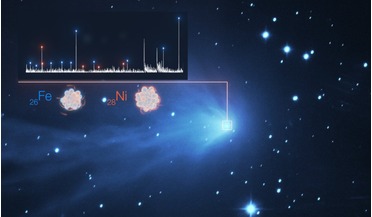 11 March 2020
Ultra-hot exoplanet literally rains iron say astronomers
11 March 2020
Ultra-hot exoplanet literally rains iron say astronomers
... of what might be iron rain pouring down on the nightside of this ultra-hot exoplanet has been detected by an international team of astronomers. Ultra-hot giant exoplanets are named so because they face daily blistering temperatures of 2,000 kelvin...
 19 May 2021
Scientists unexpectedly find heavy metal vapour in comets throughout our Solar System, and beyond
19 May 2021
Scientists unexpectedly find heavy metal vapour in comets throughout our Solar System, and beyond
... are surprising as until now gases with heavy metal atoms had only been observed in hot environments, such as in the atmospheres of ultra-hot exoplanets or evaporating comets that passed too close to the Sun. Guzik and colleagues observed 2I/Borisov...